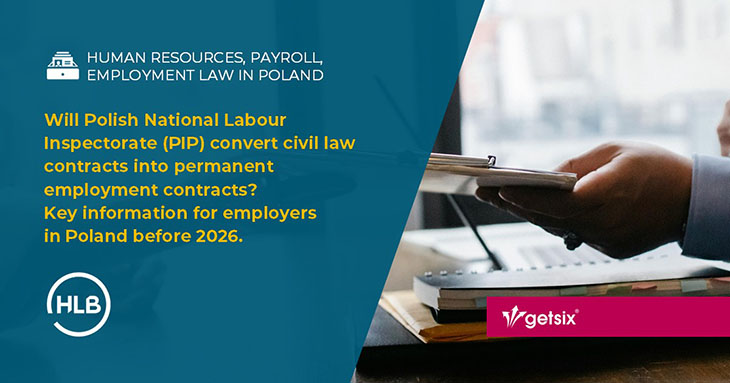Will Polish National Labour Inspectorate (PIP) convert civil law contracts into permanent employment contracts? Draft law – key information for employers in Poland before 2026
Polish Prime Minister Donald Tusk has announced the decision to suspend further work on the PIP reform in Poland, which was intended to grant the National Labour Inspectorate (PIP) the power to administratively convert civil law contracts into employment contracts. This means that the planned changes — commonly referred to as the “forced employment contract” mechanism” – will not be proceeded with in their current form..
From 1 January 2026, the National Labour Inspectorate (PIP) in Poland will be empowered to convert civil law contracts into employment contracts by administrative decision. This decision will be immediately enforceable and its organisational and financial implications for employers may be significant. The updated version of the draft of 22 October 2025 confirms the most important elements of the reform, while during the meeting on 13 November 2025, the existence of a third version of the draft, which has not yet been made public, was announced.
In this article:
Why is the planned PIP reform causing such a stir?
Currently, the Polish National Labour Inspectorate can only refer cases to court or request a change to the contract. The draft amendment provides that the labour inspector will become the authority that administratively — quickly and without the involvement of the court at the first stage — determines the existence of an employment relationship.
For entrepreneurs in Poland, this means that the form of cooperation with persons performing work will be assessed primarily in terms of the actual manner in which it is performed, not the name of the contract.
In such a dynamic legal situation, many entrepreneurs are already deciding to audit their cooperation models and review their HR documentation. The getsix® HR and payroll team supports companies in assessing the risks associated with contract classification, analysing processes and preparing the organisation for possible PIP inspections. Contact us.
Key assumptions of the draft of 22 October 2025
1. PIP decision on establishing an employment relationship
The inspector will be able to determine the existence of an employment relationship if the work is performed under the conditions specified in Article 22 § 1 of the Labour Code:
subordination, specific place and time, remuneration, performance of work for the employer.
The decision will include, among other things:
- type of employment contract,
- date of conclusion and commencement of work,
- type of work,
- place of performance,
- working time,
- amount of remuneration.
If certain parameters cannot be determined from the evidence gathered, the draft provides for presumptions such as full-time employment, an indefinite contract or minimum remuneration.
2. Transformation of various forms of cooperation
The decision may cover:
- contracts of mandate,
- contracts for specific work,
- B2B contracts,
- management contracts,
- situations of work performed without a formal contract.
In each case, the key factor is how the work is actually performed, not what the contract is called.
3. Immediate enforceability
The inspector’s decision will be enforced immediately, despite the appeal. This applies to current HR, insurance and tax obligations arising from the date of delivery of the decision.
Retroactive effects (tax or contribution) will only arise after the decision becomes final, but the limitation period will be suspended.
4. Retroactive effects until the start of cooperation
The inspector will be able to indicate the moment from which the employment relationship actually existed, regardless of when the decision is issued.
5. Digital inspections
The draft provides for:
- remote inspections,
- remote hearings,
- electronic reports and documents,
- the possibility of remote workplace inspections,
- extensive exchange of data between the National Labour Inspectorate, the Social Insurance Institution and the National Revenue Administration.
This means that in many cases the inspection process can take place without a physical visit by an inspector.
6. Higher penalties
The draft provides for an increase in penalties:
- fines for offences under Article 281 of the Labour Code — up to PLN 60,000,
- fines up to PLN 5,000, and up to PLN 10,000 for repeat offences.
7. New appeal procedure
The appeal procedure will be a two-stage process:
- appeal to the Chief Labour Inspectorate (GIP),
- then — appeal to the labour court.
The GIP will be given the possibility of self-review, i.e. changing its decision without referring the case to court.
Third version of the draft dated 13 November 2025
A meeting between social partners and the Ministry of Family, Labour and Social Policy in Poland showed that the reform is still evolving. The Ministry announced that there is a third version of the draft, but it has not been made available to employers or the public. The consultations took place without the document being presented, which was met with harsh criticism from employers.
What changes were announced only verbally?
- The retroactive period is limited to 3 years.
- The possibility of waiving the immediate enforceability – by the Chief Labour Inspector or the court.
- Clarification of liability for damages for wrong decisions.
- Restoration of the possibility for the National Labour Inspectorate (PIP) to bring actions before the court.
This reduces the risk for companies, although it still means significant liability.
This is an important safeguard for entrepreneurs in case of disputes.
This will enable claims to be pursued against the State Treasury.
The inspector will be able to choose:
– either to issue a decision,
– or to file a lawsuit to determine the employment relationship.
Employers pointed out that the failure to make the draft text available prior to the talks violated the principles of social dialogue, which was reflected in their unequivocal refusal to continue participating in the consultations.
A practical example – what might a PIP inspection look like in 2026?
Many companies in Poland base their cooperation on the B2B model, especially in the IT industry. The following example shows what a PIP inspection might look like in light of the proposed regulations after the changes come into force.
An IT company cooperates with a team of B2B programmers. The programmers provide services during fixed hours, use company equipment, perform tasks under the supervision of a manager and participate in daily operational meetings.
In 2026, the PIP conducts a remote inspection using the solutions provided for in the draft:
- it requests access to electronic documentation,
- analyses work schedules, communication history and the method of supervision of the tasks performed,
- compares data with other institutions (in accordance with the draft agreement on the exchange of information between PIP, ZUS and KAS),
- and remotely interviews the manager and the persons performing the work.
As a result, the inspector assesses that some of the associates display characteristics typical of an employment relationship, such as managerial subordination, specific working hours and the performance of tasks in a manner similar to that of an employee.
On this basis, they may issue an administrative decision establishing the existence of an employment relationship — with parameters resulting from the project (e.g. full-time, indefinite period, remuneration determined on the basis of available data).
Upon delivery of the decision, the company assumes the current obligations of an employer, including:
- keeping employee records,
- registering the employee for insurance,
- paying remuneration in accordance with the terms specified in the decision,
- applying the provisions on working time and leave.
An appeal does not suspend the execution of the decision — according to the draft — but the court or the Chief Labour Inspectorate may revoke the immediate enforceability (information from 13 November).
How can entrepreneurs prepare for the upcoming changes?
Based on the content of the draft and its purpose, many companies in Poland are already analysing their processes to reduce the risks associated with incorrect classification of contracts. In practice, this means, among other things:
- Review of existing cooperation models
- Verifying the compliance of declared cooperation rules with practice
- Organising documentation and digitising resources
- Ensuring consistent communication within the organisation
- Monitoring the legislative process
It is worth examining whether the way in which contractors or B2B associates perform their work does not in fact correspond to an employment relationship.
The draft clearly indicates the importance of the actual manner in which tasks are performed.
Remote inspections will be possible, so documents should be easily accessible in electronic form.
Many of the inspectors’ findings are based on how the work is described by those who supervise it.
The drafts are changing dynamically, and the third version of the bill has not yet been disclosed.
In practice, many employers decide to entrust these tasks to external specialists. getsix® offers support in the area of human resources and payroll, civil law contract audits and HR process analysis in terms of compliance with labour law. We help companies prepare documentation, organise cooperation models and implement solutions that minimise the risk of contracts being challenged by the National Labour Inspectorate (PIP) after the new regulations come into force.
The reform of the PIP Act may lead to a significant strengthening of the role of labour inspection and a change in the way forms of employment are assessed. The draft of 22 October 2025 provides for broad powers for inspectors, immediate enforceability of decisions and the possibility of transforming various forms of cooperation into an employment relationship. Information from 13 November indicates that the draft will be further modified, including in terms of retroactive effects and the rigour of immediate enforceability.
A full picture of the regulations will only be possible once the third version of the draft is available, but companies can already prepare their processes and documentation so that their organisation is consistent with the requirements of the draft.
Legal basis:
- Draft act amending the State Labour Inspection Act and certain other acts, version of 1 September 2025.
If you have any questions regarding this topic or if you are in need for any additional information – please do not hesitate to contact us:
HR & PAYROLL DEPARTMENT

BARBARA
ROZWADOWSKA
Head of HR & Payroll Department
Department / Senior Manager
getsix® Group
***














